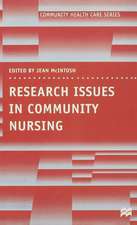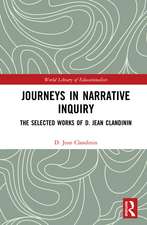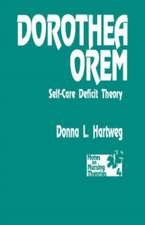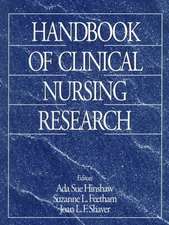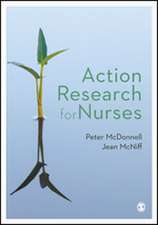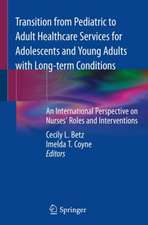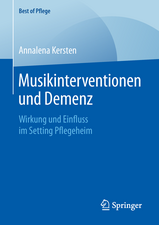Mentoring in Nursing through Narrative Stories Across the World
Editat de Nancy Rollins Gantz, Thóra B. Hafsteinsdóttiren Limba Engleză Paperback – 16 iul 2023
The book explores how mentoring, theoretical background of mentoring and how mentoring is used by nurses in all arenas where they work in health care, education, research, policy, politics, and academia in supporting nurses with their professional and career development. Over 300 mentors and mentees, from a wide range of countries across all continents, share their stories of mentoring reflecting on their development in leadership, clinical practice, education, research and politics. The book describes various types of mentoring including more traditional types of mentoring as well as virtual, online and peer mentoring. During the mentorship trajectories the nurses address an inclusive collection of issues that they are faced with and share supporting strategies. The book highlights the importance of mentoring for nurses to support their personal, and professional leadership development. Also, it emphasizes the importance of mentoring for when nurses engaged in variety of projects that could entail or encompass evidence-based clinical practice, development within education, research in the clinical arena, policy formation, political affairs, or cultural inclusion that present significant impact in patient care and healthcare outcomes within and across countries. With The Future of Nursing 2020-2030: Charting a Path to Achieve Health Equity report from the National Academies of Sciences, published in 2021, the role of nursing will become ever more dynamic and therefore the profession of nursing must be visible in improving and securing the future for patients, families, and communities across the globe. Mentoring practices to build the profession’s leaders are forever essential, acute, and imperative.
This book shows how mentoring can support nurses in further developing nursing as a profession and scientific discipline across countries to support clinical application of evidence based practice, and nursing education and research dissemination. Accordingly, this book shares essential, diverse and pioneering expertise through wide range of narrative stories that will benefit nurses at all years of experience, from early career nurses, emerging leaders, nurse educators, leaders, policy makers and nurse scientists around the globe. The nursing profession must magnify its position in health care and nurses need to proliferate their contributions throughout the globe. They can accomplish that through mentoring and “growing and nurturing other nurses” to advance and thrive in today’s world.
This book shows how mentoring can support nurses in further developing nursing as a profession and scientific discipline across countries to support clinical application of evidence based practice, and nursing education and research dissemination. Accordingly, this book shares essential, diverse and pioneering expertise through wide range of narrative stories that will benefit nurses at all years of experience, from early career nurses, emerging leaders, nurse educators, leaders, policy makers and nurse scientists around the globe. The nursing profession must magnify its position in health care and nurses need to proliferate their contributions throughout the globe. They can accomplish that through mentoring and “growing and nurturing other nurses” to advance and thrive in today’s world.
Preț: 544.57 lei
Preț vechi: 573.24 lei
-5% Nou
Puncte Express: 817
Preț estimativ în valută:
104.22€ • 113.16$ • 87.54£
104.22€ • 113.16$ • 87.54£
Carte disponibilă
Livrare economică 01-15 aprilie
Livrare express 15-21 martie pentru 102.99 lei
Preluare comenzi: 021 569.72.76
Specificații
ISBN-13: 9783031252037
ISBN-10: 3031252039
Pagini: 1047
Ilustrații: LXXXVI, 1047 p.
Dimensiuni: 178 x 254 x 41 mm
Greutate: 2.11 kg
Ediția:1st ed. 2023
Editura: Springer International Publishing
Colecția Springer
Locul publicării:Cham, Switzerland
ISBN-10: 3031252039
Pagini: 1047
Ilustrații: LXXXVI, 1047 p.
Dimensiuni: 178 x 254 x 41 mm
Greutate: 2.11 kg
Ediția:1st ed. 2023
Editura: Springer International Publishing
Colecția Springer
Locul publicării:Cham, Switzerland
Cuprins
Preface.- Foreword: Susan Hassmiller, Robert Wood Johnson Foundation.- Foreword: Pam Cipriano, International Council of Nurses President.- Foreword: Beverly Malone, National League of Nursing CEO. Introduction.- Healthy and Creative Mentors.- Preamble.- Healthy and Creative Mentors (Burke).- Mentorship, historic perspectives in today’s experiences.- Transforming the Mentorship Relationship from the Philosophical into the Practical.- From Mentee to Mentor.- Generativity and to unpack the behaviors that are associated with mentoring.- Mindfulness, clarity, and mentoring.- Part 1: Mentoring of Early-Stage and Late-Stage Career Nurses.- Ch 1: Introduction.- Ch 2: Caring Mentorship in Nursing Leadership.- Ch 3: External Mentorship to Accelerate Early Career Impact in Nursing.- Ch 4: Born to be in a Mentorship Dyad.- Ch 5: Mentoring with a purpose: Getting promoted to CNO.- Ch 6: The Power of Mentorship.- Ch 7: Mentoring throughout a nursing career: Applying Transitions Theory to guide the mentor and mentee.- Ch 8: Inspiring Late Career Nurses towards Career Progression through Mentoring.- Ch 9: Four Generations of Faculty Mentoring in Caring Science.- Ch 10: We knew it was a match.- Ch 11: Mentorship Beyond a PhD Program.- Part 2: Mentoring in Inclusivity, Equity, Diversity and Belonging.- Ch 12: Introduction.- Ch 13: Mentoring overseas qualified nurses applying for registration in the host country: Reflection on successful experience.- Ch 14: Mentorship as a Tool to Support and Retain Faculty Members of Color.- Ch 15: Walking side by side: The mentor's role in guiding the mentee's scholarship and academic career.- Ch 16: Mentorship in a clinical setting: From the lens of Diversity, Equity, Inclusion, and Belonging.- Ch 17: Mentoring for Courageous Leadership.- Ch 18: Transforming the Compass: Mentoring Latin X psychiatric nursing students for a multicultural Society.- Ch 19: From Minority Fellowship Program Mentor- Mentee to Colleagues Impacting Health Care Policy.- Ch 20: Native American Way of Mentoring.- Ch 21: Mentorship in Diversity, Equity, and Inclusion to Promote Human Flourishing for All.- Ch 22: Increasing Diversity through Mentorship and Sponsorship.- Part 3. Mentoring in Clinical Practice.- Ch 23: Introduction.- Ch 24: Fearfully and woefully made to Care.- Ch 25: Navigating Scholarship as a first-year DNP.- Ch 26: Always Learning from Each Other.- Ch 27: Mentoring in Evidence-Based Practice.- Ch 28: Mentorship in Evidence-based Practice: A Necessity for Healthcare Quality, Safety and Improved Patient Outcomes.- Ch 29: When the going gets tough.- Ch 30: Mentoring in Leadership of clinical practice in community home care.- Ch 31: Mentoring nurses through a regulatory investigation process.- Part 4: Mentoring in Nursing Education.- Ch 32: Introduction.- Ch 33: Distance can enhance mentoring: a nurse education example.- Ch 34: Lessons on Mentoring Innovation Curriculum for Caregivers in Thailand.- Ch 35: A Crossed Mentoring Story.- Ch 36: Mentoring for Role Transition: Clinician to Academia.- Ch 37: The power of mentorship: In learning, we teach, and in teaching, we learn!.- Ch 38: Impact of the Jonas Nursing and Veterans Healthcare Scholar mentoring Program.- Ch 39: Leadership mentoring: Peer mentoring experience in nursing education.- Ch 40: Innovation and Entrepreneurial Mentoring in Nursing for the Life Transformational Education.- Ch 41: Global mentorship in nursing education.- Ch 42: Caring for the caregivers a mentoring perspective: a contribution from nursing in Colombia.- Ch 43: Authentic leadership by the bedside and beyond.- Ch 44: Virtual Mentoring your Mentee.- Ch 45: A cross-cultural perspective of mentoring in nursing in Israel.- Ch 46: Knowing the Way, Show the Way: Leadership and Mentoring in Nursing Education.- Ch 47: Mentoring: Relational Experiences.- Ch 48: Mentoring relations between generations foster reciprocity, growth, and innovation.- Ch 49: Supervision to Mentoring: A satisfactoryexperience through stages of academic Development.- Ch 50: Redesign Networks in Organizations: Perspectives and Reflections in the Field of Nursing and Public Health.- Ch 51 First generation to PhD student: The faces of mentorship that shaped growth and success.- Ch 52: Mentoring grounded in shared lived experiences.- Ch 53: So you want to be a leader in nursing education? Mentoring is the way.- Ch 54: Finding your mentor in the academic jungle.- Ch 55: Mentoring the New Faculty.- Ch 56: Implementing Activity theory to realize global standards in nursing education.- Ch 57: Mentoring in Research and Academia is a faculty lifesaver.- Ch 58: The upstream and downstream effects of mentoring in research and academia.- Ch 59: Paying it Forward: Meaningful Mentoring.- Ch 60: Multicultural exposure practicum.- Ch 61: Building a Sustainable Academic Career.- Ch 62: The Next Generation of Nursing Informaticians: The Benefits of Mixing Mentoring Models.- Ch 63: Passing the Mentoring Torch : Afghanistan Narrative.- Part 5: Mentoring in Leadership.- Ch 64: Introduction.- Ch 65: Peer Mentoring through Action Learning for Strategic Leadership.- Ch 66: Investing in emerging nurse leaders: Knowledge to action.- Ch 67: Water me, I will grow.- Ch 68: The Genealogy of Leadership.- Ch 69: Mentoring continuity of a nursing professional model.- Ch 70: Appreciative Leadership Mentoring.- Ch 71: Nurturing leadership growth in clinical nurses: a blueprint through mentoring.- Ch 72: Identifying my cancer nursing leadership role through mentoring.- Ch 73: Bridging the future of nursing through leadership mentoring.- Ch 74: Growing Dynamic Leaders through Mentoring.- Ch 75: Leadership for Nursing Practice.- Ch 76: Domino mentorship. I mentor you, you mentor them.- Ch 77: Walking the way to leadership.- Ch 78: Professional Role Driven: Leadership Impact on Operation.- Ch 79: Intention to lead and mentor nurses globally.- Ch 80: Paying it Forward: Developing Emerging Nurse Leaders.- Ch 81:Growing People Through Mentoring.- Ch 82: Helping Leaders Optimize Their Personal Leadership Journey.- Ch 83: Developing leaders through mentorship.- Ch 84: Values Based Mentorship.- Ch 85: Mentoring: Unconventional Beginnings but what benefits we have Enjoy!.- Ch 86: Out of Africa. Cross continental Mentorship in critical care.- Ch 87: It is Always a Two-Way Street.- Ch 88: Patience, Perseverance, Resilience, Multi-tasking, and Everything!.- Ch 89: Leadership without a title- The power of mentoring.- Ch 90: Succession Planning: Preparing for the Future.- Ch 91: Passing the Baton: Advancing nursing through leadership mentoring; A story of mentorship in Pakistan.- Ch 92: Strategic Leadership in Mentoring.- Ch 93: Leaders shaping Leadership: Advising, Coaching, and Mentoring.- Part 6: Mentoring in Research and Academia.- Ch 94: Introduction.- Ch 95: Vision Alignment- Cognitive Reframing from An Inward to Outward Mindset in Mentoring.- Ch 96: The HEARTS Across the Lifespan in Research and Academia.- Ch 97:Mentoring in Research contributing to the health care.- Ch 98: Our joint journey in a European project and how we both grew – mentor and mentee.- Ch 99: Mentoring and establishing European collaboration.- Ch 100: Empower, encourage, and expand: Mentoring the 21st century nurse scientist.- Ch 101: Nurturing and empowering research leadership through mentoring.- Ch 102: Experiences of mentoring withing a structured academic mentorship program at a South African University.- Ch 103: Mentoring in the research: from dissertation to the entrepreneurial journey.- Ch 104: Mindful mentoring in academic research to develop self-mastery in the graduate.- Ch 105: Leadership: A process of paying it forward.- Ch 106: Educating the minds, hearts, and hands.- Ch 107: Mentorship to achieve global collaboration.- Ch 108: The 3 R’s: Revisiting the Mentored Relationship in Research.- Part 7: Mentoring in the times of Covid-19 Ch 109: Mentoring in PhD education, building role models.- Ch 110: Introduction.- Ch 111: Mentoring through a Pandemic.- Ch 112: Leading in a Pandemic.- Ch 113: Keeping a Chapter (Association) Thriving during a Pandemic.- Ch 114: In the eye of the storm: Mentorship in times of crisis.- Ch 115: Mentoring during COVID-19.- Ch 116: Mentoring in the times of COVID-19.- Ch 117: Seizing the moment for mentoring amid crisis.- Part 8: Mentoring in Policy –Healthcare, Education, Research.- Ch 118 Introduction.- Ch 119: Transcultural scenarios for health professionals in a plural and reticular society. Ch 120: Mentoring Partnerships Across Borders and Cultures: Cresting Sustainable Leadership.- Ch 121: Policy and People.- Ch 122: Building leadership competencies to navigating the world of healthcare policy.- Ch 123: Mentoring in Policy in Afghanistan.- Ch 124: Introduction.- Ch 125: Breakfasts, Open Doors, and Belonging.- Ch 126: Finding mentors in unusual places.- Ch 127: Mentoring in Politics- The Power of Partnership through “The Urgency of Now”.- Ch 128: Registered Nurse, Registered Voter.
Notă biografică
Dr. Nancy Rollins Gantz maintains a passion and endless energy for being a consistent mentor, motivator for leadership team growth and point-of-care staff coupled with emphasis on quality outcome services and patient safety values. Her personal mission is to consistently add significance and positive contribution to the nursing profession, global healthcare, diversity and the community. We are all one people that must be provided the opportunity to not just survive but thrive in this world.
During an extended international journey, she successfully coached and mentored staff, managers, and leaders to a level of effective and positive collaboration, communication, patient care services through a professional practice model in an integrated, multicultural work environment with over 2000 staff from 40 to 60 different countries and cultures. This led to Dr. Gantz’s development of the CAPPS™ International model, Cultural Appreciation through Professional Practice and Synergy.
Dr. Gantz has published on numerous topics; extensively presented and consulted to over 45 countries; held adjunct professor at assorted institutions; and participation in international and national editorial boards. Dr. Gantz is a member of Sigma Theta Tau International Nursing Honor Society, former Middle Manager Board Member of the American Organization of Nurse Executives (AONE) (now AONL) and has held numerous national and regional positions with the American Association of Critical-Care Nurses (AACN). Most recently, Dr. Gantz was a member of the AONL Innovation Approaches to Recruiting and Retaining Early Careers in Nurse Manager’s role. Recently, Dr. Gantz was elected Secretary for the Board of Directors Sigma Theta Tau International Honor Society of Nursing and is President of Beta Psi Chapter of Sigma, Portland, Oregon, USA.
She is listed in Who’s Who in America, Who’s Who in Emerging Leaders in America, Who’s Who in American Nursing as well as numerous others. She has received several other honors and awards including the American Organization of Nurse Leaders PRISM Award for leadership in cultural diversity, the Lloydena Grimes Award for Nursing Excellence from Lindfield-Good Samaritan School of Nursing and, most recently, International Leaders in Achievement. Dr. Gantz is a Wharton Fellow through the completion of the Johnson & Johnson Wharton Program for Nurse Executives, The Wharton Business School, and University of Pennsylvania, U.S.A. with over 40 years of nursing leadership. She is the editor and author of the book “101 Global Leadership Lessons for Nurses: Shared Legacies from Leaders and their Mentors” published by Sigma Theta Tau International.
During an extended international journey, she successfully coached and mentored staff, managers, and leaders to a level of effective and positive collaboration, communication, patient care services through a professional practice model in an integrated, multicultural work environment with over 2000 staff from 40 to 60 different countries and cultures. This led to Dr. Gantz’s development of the CAPPS™ International model, Cultural Appreciation through Professional Practice and Synergy.
Dr. Gantz has published on numerous topics; extensively presented and consulted to over 45 countries; held adjunct professor at assorted institutions; and participation in international and national editorial boards. Dr. Gantz is a member of Sigma Theta Tau International Nursing Honor Society, former Middle Manager Board Member of the American Organization of Nurse Executives (AONE) (now AONL) and has held numerous national and regional positions with the American Association of Critical-Care Nurses (AACN). Most recently, Dr. Gantz was a member of the AONL Innovation Approaches to Recruiting and Retaining Early Careers in Nurse Manager’s role. Recently, Dr. Gantz was elected Secretary for the Board of Directors Sigma Theta Tau International Honor Society of Nursing and is President of Beta Psi Chapter of Sigma, Portland, Oregon, USA.
She is listed in Who’s Who in America, Who’s Who in Emerging Leaders in America, Who’s Who in American Nursing as well as numerous others. She has received several other honors and awards including the American Organization of Nurse Leaders PRISM Award for leadership in cultural diversity, the Lloydena Grimes Award for Nursing Excellence from Lindfield-Good Samaritan School of Nursing and, most recently, International Leaders in Achievement. Dr. Gantz is a Wharton Fellow through the completion of the Johnson & Johnson Wharton Program for Nurse Executives, The Wharton Business School, and University of Pennsylvania, U.S.A. with over 40 years of nursing leadership. She is the editor and author of the book “101 Global Leadership Lessons for Nurses: Shared Legacies from Leaders and their Mentors” published by Sigma Theta Tau International.
Dr. Hafsteinsdóttir is a member of Sigma Theta Tau International Nursing Honor Society and served as a director of the international board of Sigma for the years (2014-2019). Currently she serves currently on the international board of Sigma Foundation for Nursing of Sigma Theta Tau International Nursing Honor Society. Earlier Dr. Hafsteinsdóttir served as the president of the Rho Chi Chapter at Large, Utrecht, the Netherlands and served as the first Regional Coordinator for the Europe Region for Sigma. Dr. Hafsteinsdóttir is a member of the European Academy of Nursing Science (EANS), a member of Academia Europeae and Fellow ad Eundem of the Faculty of Nursing and Midwifery of Royal College of Surgeons Ireland.
Dr. Hafsteinsdóttir is the author and editor of the book: Leadership in Nursing: Experiences from the European Nordic Countries was published by Springer. Dr. Hafsteinsdóttir has over 100 international publications and has given over 100 lectures at international conferences.
Textul de pe ultima copertă
The book explores how mentoring, theoretical background of mentoring and how mentoring is used by nurses in all arenas where they work in health care, education, research, policy, politics, and academia in supporting nurses with their professional and career development. Over 300 mentors and mentees, from a wide range of countries across all continents, share their stories of mentoring reflecting on their development in leadership, clinical practice, education, research and politics. The book describes various types of mentoring including more traditional types of mentoring as well as virtual, online and peer mentoring. During the mentorship trajectories the nurses address an inclusive collection of issues that they are faced with and share supporting strategies. The book highlights the importance of mentoring for nurses to support their personal, and professional leadership development. Also, it emphasizes the importance of mentoring for when nurses engaged in variety of projects that could entail or encompass evidence-based clinical practice, development within education, research in the clinical arena, policy formation, political affairs, or cultural inclusion that present significant impact in patient care and healthcare outcomes within and across countries. With The Future of Nursing 2020-2030: Charting a Path to Achieve Health Equity report from the National Academies of Sciences, published in 2021, the role of nursing will become ever more dynamic and therefore the profession of nursing must be visible in improving and securing the future for patients, families, and communities across the globe. Mentoring practices to build the profession’s leaders are forever essential, acute, and imperative.
This book shows how mentoring can support nurses in further developing nursing as a profession and scientific discipline across countries to support clinical application of evidence based practice, and nursing education and research dissemination. Accordingly, this book shares essential, diverse and pioneering expertise through wide range of narrative stories that will benefit nurses at all years of experience, from early career nurses, emerging leaders, nurse educators, leaders, policy makers and nurse scientists around the globe. The nursing profession must magnify its position in health care and nurses need to proliferate their contributions throughout the globe. They can accomplish that through mentoring and “growing and nurturing other nurses” to advance and thrive in today’s world.
This book shows how mentoring can support nurses in further developing nursing as a profession and scientific discipline across countries to support clinical application of evidence based practice, and nursing education and research dissemination. Accordingly, this book shares essential, diverse and pioneering expertise through wide range of narrative stories that will benefit nurses at all years of experience, from early career nurses, emerging leaders, nurse educators, leaders, policy makers and nurse scientists around the globe. The nursing profession must magnify its position in health care and nurses need to proliferate their contributions throughout the globe. They can accomplish that through mentoring and “growing and nurturing other nurses” to advance and thrive in today’s world.
Caracteristici
First book devoted to the mentoring stories of nurses Addresses mentoring trajectories of over 300 mentor and mentee nurse authors from all continents Authored by prestigious nursing experts in mentoring and internationally recognized in their field

